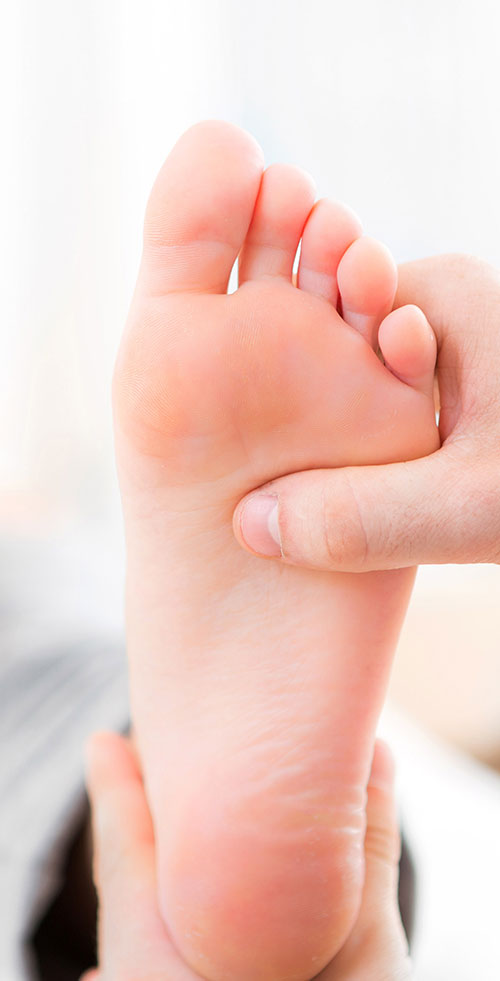Treating Your Peripheral Neuropathy
What causes nerve pain in toes, feet and lower legs?
Peripheral neuropathy is a progressive and degenerative disorder of the nerves connecting the soft tissues of the body with the autonomic or central nervous system.
The peripheral nerves control your sense of touch, pressure and balance down to the toes, the way you feel temperature and pain, your muscle strength, and your ability to open or contract your blood vessels. Most of the time, neuropathy starts with a loss of feeling in the toes, and then moves into the feet causing pain or gradual loss of feeling up to the legs. Patients with peripheral neuropathy may have the same symptoms in their fingers and hands as well.
Peripheral neuropathy often results from an underlying disease such as diabetes, kidney insufficiency, or vitamin B deficiency. In some cases, exposure to toxic substances, chemotherapy, heavy metal toxicity, recreational drug use and alcoholism can all result in temporary or permanent damage to the peripheral nerves. Other causes include thyroid disorders, rheumatoid arthritis, lupus, leprosy and heredity. However, not every case has a discernable cause.
One-third of peripheral neuropathy cases are caused by a long-standing diabetic condition. Keeping with a blood sugar level at the higher end of the norm for decades may cause progressive nerve damage. Many people are actually sedentary and overweight, have high cholesterol, high blood pressure, and blood sugar levels high enough to be affected by a metabolic or pre-diabetic syndrome, but have never been formally diagnosed as being diabetic by their family physician.

Peripheral Neuropathy can be painful and/or insensate
Abnormal tingling, burning or numbness in toes and feet is often the first symptom of an undiagnosed, long-standing diabetic or pre-diabetic condition. Diabetic Peripheral Neuropathy (DPN) affects 50% of people with type 1 and type 2 diabetes in Canada. Half of them have Painful Diabetic Peripheral Neuropathy (PDPN) and the other half have Insensate Peripheral Diabetic Neuropathy (IDPN). The pain associated with PDPN is not triggered by walking but is worse at night when someone is off their feet and has them elevated. They have higher rates of work impairment, are hospitalized 2.5 times more frequently and cost thousands of dollars more per year than non-diabetic people to provincial health care systems.
Living with the pain from Peripheral Neuropathy impacts lives as much as amputation
Recent studies have concluded that Peripheral Diabetic Neuropathy is comparable to amputation in terms of negative impact on quality of life. Because of worsening pain at night, patients may have serious problems falling asleep. Sleep deprivation, increased anxiety/depression and reduction in exercise tolerance will only worsen ones general health.
No conventional treatment can regenerate ailing nerves
In cases of vitamin deficiency, supplements may help if this is the only culprit. Medications have shown limited benefits in addressing the root cause of degenerative nerve disease. Pain medications and lidocaine creams may help in reducing part of the discomfort, but no pill or cream can help in healing ailing nerves. Unfortunately, complete resolution of pain is rare regardless of the type of medications; and the higher the dose, the more likely side effects will kick in.
Are you suffering from neuropathic foot pain or numbness?
You are likely to suffer from peripheral neuropathy if you answer yes to one or more of these 11 questions:
- Are you suffering from increased sensitivity or loss of sensation, weird sensations of heat or cold, tingling, shooting, pins and needles, or burning pain sensations in your feet?
- Do you have muscle cramps, tightness, weakness, or a feeling of heaviness in your feet, ankles and legs?
- Do you feel like you are walking barefoot on marbles or hot sand?
- Are you afraid to go to bed at night, knowing that foot pain will keep you up?
- Do you experience numbness in your feet or wooden feet?
- Can you not feel the floor and your brake pedal like you used to?
- Are you losing your balance or your capacity to drive safely?
- Do you find yourself progressively reducing your walking distance to short indoor shuffling around?
- Have you not enjoyed a 60-minute pain-free outdoor walk in some time?
- Do you experience difficulty walking, compensating with a wider stance and less fluid gait?
- Do you suffer from profuse sweating in the soles of your feet?
What can a Doctor of Podiatric Medicine do?
In Ontario, a doctor of podiatric medicine, either registered as a chiropodist or as a podiatrist, is a foot specialist. We should be the very first health professional you call whenever you experience foot pain or problems.
When medically necessary, a doctor of podiatric medicine can take x-rays and perform surgery to correct foot conditions. Before we recommend surgery, we will explore many conservative therapies that are available for our patients, and then recommend the very best course of treatment.
You do not have to suffer from pain or numbness in your feet any longer. Reach out to Ottawa Foot Clinic by calling (613) 595-9700 or filling out our contact form online. We would love to work with you to find the best ways to make your feet feel better.

